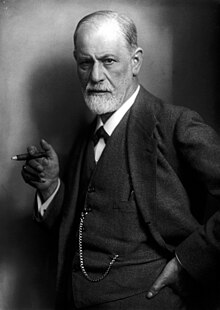User:David.markewitz/sandbox
Psychic determinism, a central concept of psychoanalysis, is predicated on the theory that nothing occurs randomly. Thus, slips of the tongue, forgetting an individual’s name, and any other verbal associations or mistakes are assumed to have psychological meaning. Psychoanalytic therapists will generally probe clients and have them elaborate on why something “popped into” their head or why they may have forgotten someone’s name rather than ignoring the material. The therapist then analyze this discussion for clues revealing unconscious connections to the slip of verbal association. Psychic determinism is related to the overarching concept of determinism, specifically in terms of human actions. Therapists who adhere to the belief in psychic determinism assume that human action and decisions are predetermined and are not necessarily under their own control.[1]
Origin
[edit]
In 1901 Sigmund Freud published The Psychopathology of Everyday Life in which he detailed the importance of generally trivial or overlooked details in therapy sessions. It was in this work that Freud began to use the term “Fehlleistungen” to refer to seemingly unintended slips of the tongue. Freud interpreted these slips of the tongue as the result of unconscious desires or impulses.[2] During psychoanalytic therapy sessions Freud would dissect and question participants if they made a mental lapse or a slip of the tongue, as he believed this would allow him an understanding of the unconscious motives of his patient.
Although the “Freudian slip” is considered the most popularized example of psychic determinism from Freud’s work, this concept of determinism is not the only one. The term psychic determinism encompasses other forms of mental lapses such as forgetting someone’s name.
Clinical Setting
[edit]Psychic determinism was an extremely important feature of free association during psychoanalytic therapy. During free association patients are encouraged to state whatever comes to their mind during the therapy session without censoring themselves. During free association the client may at times have an image come to mind or say something that seems odd or unintentional. Instead of overlooking this, the therapist would begin to delve into the slip and determine the underlying cause of it, which Freud claimed as generally some unconscious impulse.[3] During psychoanalysis and free association the patient would generally lie on a coach with the therapist sitting next to them. They would then begin their free association session.
Example
[edit]Patient
[edit]"I am thinking of the fluffy clouds I seem to see with my very eyes. They are white and pearly. The sky is full of clouds but a few azure patches can still be seen here and there...
Clouds keep changing their shapes. They are fluid because they are condensed water particles...
I am thinking I may have an obsession about this water. The doctor has told me I am dehydrated; there's not enough water in my body. He suggested I should drink 2-3 liters of water every day. Mineral water or tea!
I thought there is a connection between my need to add salt to my food and thirst. My body has found itself a pretext - salty food - to make me drink more water. I have a lot of thoughts about the manifestations of my body, which seem logical and aim at inner balance. Everybody has in fact got an inner physician in oneself. What need is there of an outside doctor then? If you allow yourself lie at the will of your free inclinations, with no assumptions whatsoever, you will have the intuition of making things that may surprise you, nevertheless useful to your body and securing your health and high spirits.
I read somewhere that one can be one's own doctor... Everybody can be one's own doctor."
Therapist Analysis
[edit]"We put a stop here to the flow of our patient's associations. We may notice these are indirectly related to the relationship with her therapist. Her associtaions related to the spontaneous medicine of her body lead to the idea that no physician is in fact necessary. The patient thinks the psychoanalyst has in fact no contribution to her well being, that she could very well do without one.
We must admit the series of free associations produced by the patient are somehow related to her present circumstances, including a recent reality: her psychoanalytic therapy. The novelty of the therapy, the relationship with the psychoanalyst, automatically induces thoughts, remarks, more or less recent memories. The fact that, during her therapy, the patient alludes to a doctor, who had in fact done nothing to help her, is no mere chance. This memory can be related to the present circumstance and it may be translated in the patient's skepticism concerning the utility of this analytic therapy.
Nevertheless, this skepticism has an even older history, bringing to the fore the patient's relationship to her mother, when still a child, and dependent on her parents' support."[4]
References
[edit]- ^ Kramer, Geoffrey (2009). Clinical Psychology. New Jersey: Pearson. p. 237.
- ^ Freud, Sigmund (1989). The Psychopathology of Everyday Life. New York: W. W. Norton.
- ^ Thurschwell, Pamela (2009). Sigmund Freud. London: Routledge. p. 24.
- ^ Chiriac, Jean. "About the Free Association Method". AROPA.

